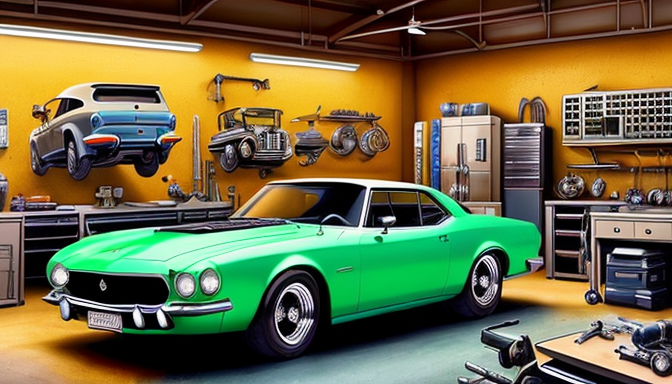Welcome to the world of car ownership, where your vehicle is not just a mode of transport, but a trusty companion on the road! This guide provides essential tips and knowledge for novice car owners, helping them understand the importance of regular maintenance and how to keep their vehicles running smoothly. Think of your car as a living organism; just like you need to eat, sleep, and exercise, your car needs its own set of care routines to thrive.
Regular maintenance is akin to giving your car a health check-up. It’s not just about fixing what’s broken but ensuring everything runs like a well-oiled machine. By paying attention to your vehicle’s needs, you can avoid those dreaded breakdowns and costly repairs. So, what are these essential maintenance tasks? Well, let’s dive into the basics that every car owner should know:
- Oil Changes: Just as your body needs water, your car needs oil to keep its engine lubricated and healthy.
- Tire Rotations: Think of this as giving your tires a fair chance to wear evenly, enhancing their lifespan.
- Brake Inspections: Safety first! Regular checks can save you from dangerous situations on the road.
Understanding these tasks will not only keep your vehicle in top shape but also empower you as a car owner. So, buckle up and let’s embark on this journey of car maintenance together!
Essential Maintenance Tasks
When it comes to keeping your car in tip-top shape, regular maintenance is non-negotiable. Think of your vehicle as a living organism; just like you need food and exercise to thrive, your car needs its own special care to run smoothly. So, what are the essential maintenance tasks every car owner should embrace? Let’s dive in!
First and foremost, oil changes are crucial. Imagine your engine as a heart; oil is the lifeblood that keeps everything pumping. Regularly changing your oil, typically every 5,000 to 7,500 miles, can significantly enhance engine performance and longevity. But wait, there’s more! Don’t forget about tire rotations. Tires wear unevenly, and rotating them every 6,000 to 8,000 miles ensures even wear and extends their lifespan. Plus, it can improve your gas mileage—who doesn’t love saving at the pump?
Next up is brake inspections. Your brakes are your car’s safety net, so make sure to check them regularly. A simple visual inspection can save you from a costly repair down the line. If you hear any strange noises or feel vibrations, it’s time to get them checked. Lastly, keep an eye on your fluid levels—transmission fluid, coolant, and brake fluid are just as important as the oil in your engine.
To wrap it all up, think of these tasks as your car’s personal training regimen. Just a little effort can go a long way in keeping your vehicle healthy and happy.

Common Car Problems and Solutions
As a new car owner, it’s crucial to be aware of common car problems that can pop up when you least expect them. Think of your vehicle as a living entity; it requires attention and care to thrive. Ignoring minor issues is like letting a small crack in a dam grow into a major flood. So, what are some of these pesky problems, and how can you tackle them?
One of the most frequent issues is engine overheating. This can happen due to low coolant levels, a faulty thermostat, or a broken water pump. If you notice your temperature gauge creeping into the red zone, it’s time to pull over and investigate. Always keep an eye on your coolant levels and consider checking for leaks regularly.
Another common problem is dead batteries. Imagine planning a road trip, only to find your car won’t start! To prevent this, make it a habit to inspect your battery terminals for corrosion and ensure that your battery is securely fastened. If your battery is older than three years, consider having it tested at your local auto parts store.
Lastly, let’s talk about brake issues. Squeaking or grinding noises when you apply the brakes can indicate worn-out brake pads. Ignoring this can lead to more severe damage and costly repairs. Regularly inspect your brakes and replace pads as needed to ensure your safety on the road.
In conclusion, staying proactive with your car maintenance can save you a lot of headaches and money down the line. Remember, a little attention goes a long way in keeping your vehicle running smoothly!
Frequently Asked Questions
- How often should I change my oil?
Generally, it’s recommended to change your oil every 3,000 to 5,000 miles. However, always check your owner’s manual for specific guidelines as some newer models can go longer!
- What are the signs that my brakes need inspection?
If you hear squeaking or grinding noises, experience a pulsating brake pedal, or notice a longer stopping distance, it’s time to get your brakes checked. Think of it like a warning sign that your car is sending you!
- How can I tell if my tires need rotating?
If you notice uneven wear on your tires or if your car pulls to one side, it might be time for a rotation. Regular rotation helps ensure even wear and prolongs tire life!
- What should I do if my check engine light comes on?
Don’t panic! First, check for any loose gas caps. If it’s still on, it’s best to get it diagnosed by a professional. Ignoring it can lead to bigger issues down the road!
- Is it necessary to follow a maintenance schedule?
Absolutely! Following a maintenance schedule can save you money in the long run by preventing major repairs and keeping your car running smoothly. Think of it as a health check-up for your vehicle!